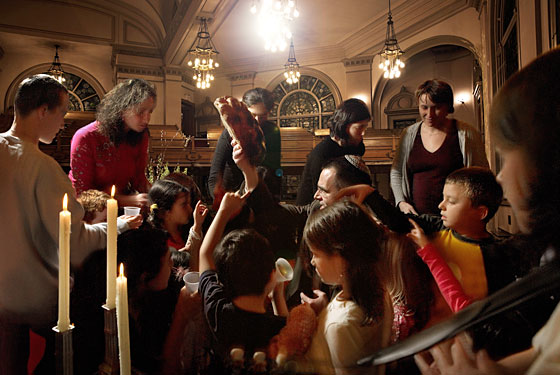
Like many first encounters with Rabbi Andy Bachman, Leah Rosen’s didn’t take place in a synagogue. Rosen, a social worker, and her fiancé, Matt Schrag, who works in Internet advertising, were shopping for a wedding officiant and had arranged to meet their new rabbi in a Park Slope Starbucks. They’d begun chatting when a vaguely familiar song came on the sound system. The couple couldn’t place it—but Bachman, dressed as usual like an indifferent fortysomething dad, could: “The Killing Moon,” by Echo and the Bunnymen.
“We were like, ‘Oh, my God, he’s a rabbi?’” Rosen recalls.
It’s rare, of course, to find a rabbi with such indie-rock fluency—but it’s even rarer to find one who’s not flogging that knowledge in an effort to seem hip with the kids. Such is the appeal of Bachman, a religious leader who balances worldly knowledge and approachability with a spiritual detachment therefrom. If you are a young, unaffiliated, but searching Jew in the city, you’ve probably heard his name over the past year. If you’re one of his followers, you may have seen him at Jewltide, a Christmas Eve “alternative to Chinese food and a movie” that kicked off in 2003 with a Matisyahu concert at Southpaw, or been to his High Holiday services in Prospect Park. Or yours may just be one of the 100 families that have joined Park Slope’s Congregation Beth Elohim since July, when he took over as head rabbi of the large but stagnant Reform synagogue. Since the 43-year-old came onboard, it’s seen a 20 percent rise in membership at a time when synagogue affiliation nationwide is flat. The growth has come almost entirely from young couples with children, and Bachman has lured them to a synagogue whose physical appearance and reputation are conspicuously Establishment. One of the newest members, in fact, is Douglas Rushkoff—author of 2003’s Nothing Sacred, one of the harshest condemnations of institutional Judaism ever written. Says Rushkoff, “If I didn’t know Andy personally, nothing would get me in there,” he says. “It’s this 21st-century Judaism in this nineteenth-century facility.”
Despite such praise, Bachman himself is skeptical of “hipster Judaism,” the kind that fetishizes kitschy bar mitzvah photos. He learned the limits of a purely cultural approach when he was interim director of Reboot, the nonprofit whose projects have included retreats for Jewish power-networking and the reissue of irony-laden records like Jewface, an anthology of “Jewish minstrel songs.” Such enterprises were “designed to till the soil of a certain generation,” Bachman now says. “And that’s fine. But there’s still a life to live. What do I do about a Bris for my son? High Holidays? Marriage? That’s by far the more important work.”
Though many congregation members call his relaxed style a breath of fresh air after years of enduring scolding from aloof religious elders, Bachman himself isn’t rebelling against a stultifying upbringing. The son of a Lutheran mother who converted to Judaism and a Jewish father, he describes a mostly secular youth of obsessions with sports and politics. He only became serious about the Jewish religion, he says, as a student at the University of Wisconsin. (His brother is nonreligious, one of his sisters is Catholic, and one is a practicing Jew.) Bachman’s career choices after rabbinical school—campus work at NYU, then at Reboot—would seem to indicate little interest in cultivating a traditional congregation.
But he was a new father meeting young Jewish families. They were looking for a community with which to worship, but synagogues were literal reminders of Sunday-school boredom. In 2003, Bachman, his wife, and a core group of their friends started the Brooklyn Jews group. At first, they were a few dozen people meeting for Friday-night dinners. But before long, the e-mail list had grown to 1,000 and hundreds were gathering for events. Members were mostly young, the group had no official building, and its events would mix drinking with Torah study. In those ways it seemed contemporary, but in one important way Bachman’s vision was more nineteenth century than 21st: The group was organized around the embrace of proximity. In the old country, of course, where Jews were restricted to ghettos or clustered in shtetls, all rabbis were neighborhood rabbis. In Orthodox communities, where everyone must be close enough to synagogue to walk there on Saturdays, they still are. But when Reform Jews fled cities for the suburbs, they lost that kind of informal, associative relationship with their clergy. The rabbi became someone you saw only on the weekend.
Bachman’s followers are neighbors, drawn mostly from the precincts of brownstone Brooklyn. “The concept of the ‘neighborhood rabbi’ is at the core of my work,” Bachman says. “If I forget to make a call to a sick person, if I was too brusque with someone, if I missed an appointment, I hear about it immediately because we all live in the same neighborhood.” Before taking the job at Beth Elohim, Bachman warned the hiring committee that he wouldn’t be in the office much. Instead, he makes house calls (recently, he held one with Park Slope resident Andy Postman at Game 7 of the Mets-Cardinals playoff series).
But institutional Judaism is older than the Mets and will have more staying power than Southpaw. People keep coming back for a reason. For some it’s prayer, for others holiday rituals, for others a place to organize their social activism. But more than anything, the seekers Bachman meets want a community distinct from the gym or the office. Bachman’s given them a place to share their tradition and pass it on to their children without the pieties that drove so many of them away. He isn’t really inventing anything new—he’s just had the good sense not to abandon everything old.